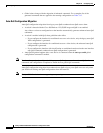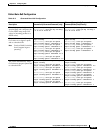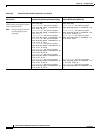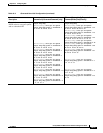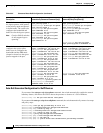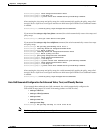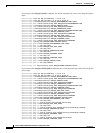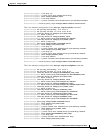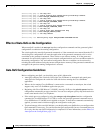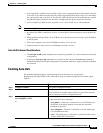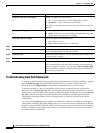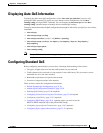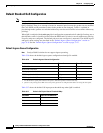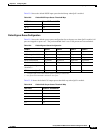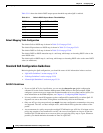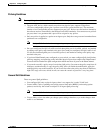
33-32
Catalyst 2960 and 2960-S Switch Software Configuration Guide
OL-8603-09
Chapter 33 Configuring QoS
Configuring Auto-QoS
Switch(config-pmap-c)# set dscp af11
Switch(config-pmap-c)# police 10000000 8000 exceed-action policed-dscp-transmit
Switch(config-pmap)# class AUTOQOS_TRANSACTION_CLASS
Switch(config-pmap-c)# set dscp af21
Switch(config-pmap-c)# police 10000000 8000 exceed-action policed-dscp-transmit
Switch(config-pmap)# class AUTOQOS_SCAVANGER_CLASS
Switch(config-pmap-c)# set dscp cs1
Switch(config-pmap-c)# police 10000000 8000 exceed-action drop
Switch(config-pmap)# class AUTOQOS_SIGNALING_CLASS
Switch(config-pmap-c)# set dscp cs3
Switch(config-pmap-c)# police 32000 8000 exceed-action drop
Switch(config-pmap)# class AUTOQOS_DEFAULT_CLASS
Switch(config-pmap-c)# set dscp default
;
Switch(config-if)# service-policy input AUTOQOS-SRND4-SOFTPHONE-POLICY
Effects of Auto-QoS on the Configuration
When auto-QoS is enabled, the auto qos interface configuration commands and the generated global
configuration are added to the running configuration.
The switch applies the auto-QoS-generated commands as if the commands were entered from the CLI.
An existing user configuration can cause the application of the generated commands to fail or to be
overridden by the generated commands. These actions occur without warning. If all the generated
commands are successfully applied, any user-entered configuration that was not overridden remains in
the running configuration. Any user-entered configuration that was overridden can be retrieved by
reloading the switch without saving the current configuration to memory. If the generated commands are
not applied, the previous running configuration is restored.
Auto-QoS Configuration Guidelines
Before configuring auto-QoS, you should be aware of this information:
• Auto-QoS configures the switch for VoIP with Cisco IP Phones on nonrouted and routed ports.
Auto-QoS also configures the switch for VoIP with devices running the Cisco SoftPhone
application.
• When a device running Cisco SoftPhone is connected to a nonrouted or routed port, the switch
supports only one Cisco SoftPhone application per port.
• Beginning with Cisco IOS Release 12.2(40)SE, Auto-Qos VoIP uses the priority-queue interface
configuration command for an egress interface. You can also configure a policy-map and trust device
on the same interface for Cisco IP phones.
• If the switch port was configure by using the auto qos voip cisco-phone interface configuration
command in Cisco IOS Release 12.2(37)SE or earlier, the auto-QoS generated commands new to
Cisco IOS Release 12.2(40)SE are not applied to the port. To have these commands automatically
applied, you must remove and then reapply the configuration to the port.
• To take advantage of the auto-QoS defaults, you should enable auto-QoS before you configure other
QoS commands. If necessary, you can fine-tune the QoS configuration, but we recommend that you
do so only after the auto-QoS configuration is completed. For more information, see the Effects of
Auto-QoS on the Configuration, page 33-32.



